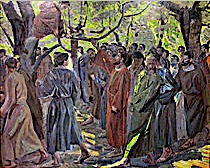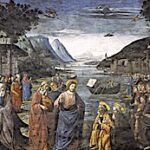Illustration: Zacchaeus by Niels Larsen Stevns Niels Larsen Stevns. Jesus calls Zacchaeus down from his height in the tree
Catechesis on prayer – 17. The blessing, Wednesday, 2nd December 2020 (2020 – not 2023!)
“Everyone saw evil in Zacchaus; instead, Jesus saw a glimmer of goodness– out of his curiosity to see Jesus”
Dear Brothers and Sisters,
Today we will reflect on an essential dimension of prayer: blessing. We continue our reflections on prayer.
In the accounts of creation (cf. Gen 1-2), God blesses life again and again, always. He blesses the animals (1:22); he blesses the man and the woman (1:28); finally, he blesses the Sabbath, the day of rest and the enjoyment of all of creation (2:3). It is God who blesses. In the early pages of the Bible, there is a constant repetition of blessings. God blesses, but people also give blessings, and they soon discover that the blessing has a special power that accompanies those who receive it throughout their lives, and that disposes the human heart to allow God to transform it (cf. Second Vatican Council Constitution Sacrosanctum Concilium, 61 – for well-disposed members of the faithful, the liturgy of the sacraments and sacramentals sanctifies almost every event in their lives; they are given access to the stream of divine grace which flows from the paschal mystery of Christ’s passion, death, the resurrection, the font from which all sacraments and sacramentals draw their power. There is hardly any proper use of material things that cannot be directed in this way to the sanctification of man and the praise of God). Thus, at the beginning of the world, there is God who “speaks goodness” [dice-bene], he blesses [bene-dice], he speaks goodness [dice-bene].
He sees that every work of his hands is good and beautiful, and when he creates man, and creation is complete, he recognizes that it is “very good” (Gen 1:31).
Shortly thereafter, the beauty that God had imprinted within his work will change, and the human being will become a degenerate creature, capable of spreading evil and death in the world; but nothing will ever take away God’s original imprint, an imprint of goodness that God placed in the world, in human nature, in all of us: the capacity to bless and the fact of being blessed.
God did not make a mistake in creation nor in the creation of man.
The hope of the world lies entirely in God’s blessing: he continues to love us, to wish us well. as the poet Péguy said He is the first who continues to hope for our good (The Portico of the Mystery of the Second Virtue, first ed. 1911).
God’s great blessing is Jesus Christ; his Son is God’s greatest gift. He is a blessing to all mankind. He is the blessing that saved us all. He is the eternal Word with which the Father blessed us “while we were yet sinners” (says Saint Paul Rom 5:8), the Word made flesh and sacrificed for us on the cross. Saint Paul proclaims God’s plan of love with emotion. And he says it like this: “Blessed be the God and Father of our Lord Jesus Christ, who has blessed us in Christ with every spiritual blessing in the heavenly places, even as he chose us in him before the foundation of the world, that we should be holy and blameless before him. In love he predestined us to be his children through Jesus Christ, according to the purpose of his will, to the praise of his glorious grace which he freely bestowed on us in the Beloved” (Eph 1:3-6). There is no sin that can completely erase the image of Christ that is present in each one of us.
No sin can erase that image that God has given us – the image of Christ. Sin can disfigure it, but it cannot remove it from God’s mercy. A sinner can remain in error for a long time, but God is patient till the end, hoping that [the sinner’s] heart will eventually open and change. God is like a good father and like a good mother – he is also a good mother: they never stop loving their child, no matter what he or she may do wrong, always. I am reminded of the many times I have seen people standing in line to enter a prison.
Many mothers line up to see their imprisoned child: they do not stop loving their child and they know that the people passing by on the bus are thinking: “Ah, that’s the mother of a prisoner”.
Yet they are not embarrassed; or rather, they are embarrassed but they go ahead, because their child is more important than their embarrassment. So we are more important to God than all of the sins that we can commit, because he is a Father, he is a Mother, He is pure love, He has blessed us forever.
And he will never cease to bless us.
It is a powerful experience to read these biblical texts of blessing in a prison, or in a rehabilitation group.
To make these people feel that they are still blessed, in spite of their grave mistakes, that the Heavenly Father continues to desire their good and to hope that, in the end, they will open themselves to the good.
Even if their closest relatives have abandoned them, judging them to be irredeemable, they are still Gods children. God cannot erase the image of sons and daughters in us; each one of us is His son, His daughter.
Sometimes we see miracles: men and women who are reborn because they find this blessing that has anointed them as children. God’s grace changes lives: he takes us as we are, but he never leaves us as we are.
Let us consider, for example, what Jesus did with Zacchaeus (Lk 19:1-10 – Jesus entered Jericho and was passing through. 2 And there was a man named Zacchaeus; he was a chief tax collector, and rich. 3 And he sought to see who Jesus was, but could not, on account of the crowd, because he was small of stature. 4 So he ran on ahead and climbed up into a sycamore tree to see him, for he was to pass that way. 5 And when Jesus came to the place, he looked up and said to him, “Zacchaeus, make haste and come down; for I must stay at your house today.” 6 So he made haste and came down, and received him joyfully. 7 And when they saw it they all murmured, “He has gone in to be the guest of a man who is a sinner.” 8 And Zacchaeus stood and said to the Lord, “Behold, Lord, the half of my goods I give to the poor; and if I have defrauded any one of anything, I restore it fourfold.” 9 And Jesus said to him, “Today salvation has come to this house, since he also is a son of Abraham. 10 For the Son of man came to seek and to save the lost.”).
Everyone saw evil in him; instead, Jesus saw a glimmer of goodness, and out of this – out of his curiosity to see Jesus – He poured out the mercy that saves. In this way, first Zacchaeus’ heart was changed, and then his life. Jesus sees the inextinguishable blessing of the Father in the people who are rejected and repudiated.
Zacchaeus was a public sinner; he had done so many terrible things, but Jesus saw that indelible mark of the Father’s blessing and had compassion. That phrase that is repeated often in the Gospel, “He was moved with compassion”, and that compassion led Jesus to help Zacchaeus and to change his heart.
What’s more, Jesus came to identify himself with every person in need (see Mt 25:31-46). In the passage of Matthew 25, the final account by which all of us will be judged, Jesus says: “I was hungry, I was naked, I was in prison, I was in hospital, I was there…”.
To God who blesses, we a;sp respond by blessing – God has taught us how to bless and we must bless – through the prayer of praise, adoration and thanksgiving.
The Catechism says: “The prayer of blessing is man’s response to God’s gifts: because God blesses, the human heart can in turn bless the One who is the source of every blessing” (n. 2626).
Prayer is joy and thanksgiving. God did not wait for us to convert before he began to love us, but he loved us long before, when we were still in sin.
We cannot only bless this God who blesses us; we must bless everyone in Him, all people, bless God and bless our brothers and sisters, bless the world.
This is the root of Christian meekness, the ability to feel blessed and the ability to bless.
If we all did that, surely there would be no wars.
This world needs blessings, and we can give blessings and receive blessings.
The Father loves us, and the only thing that remains for us is the joy of blessing him, and the joy of thanking Him, and of learning from Him not to curse, but to bless.
Here is just a word for people who are in the habit of cursing, people who always have a bad word, a curse, on their lips and in their hearts. Each of us can think: “Do I have this habit of cursing like this?”
And ask the Lord for the grace to change this habit because we have a blessed heart and cursing cannot come from a blessed heart.
May the Lord teach us never to curse, but to bless.


